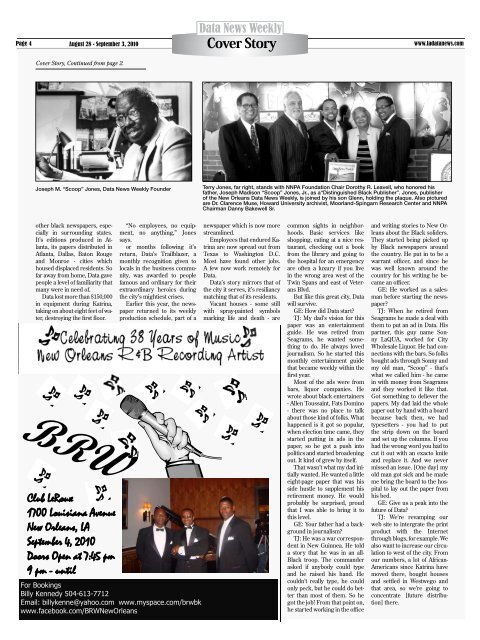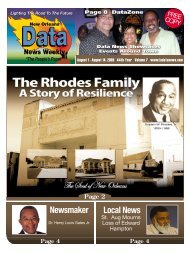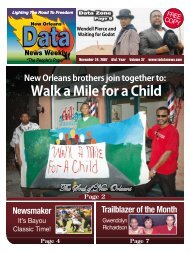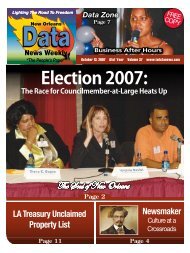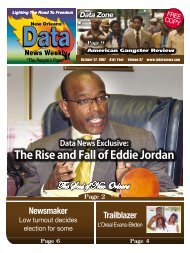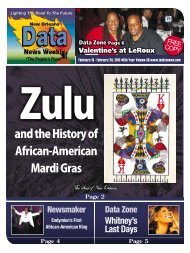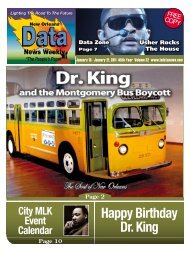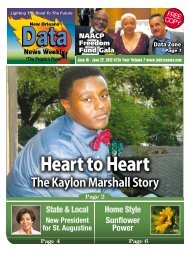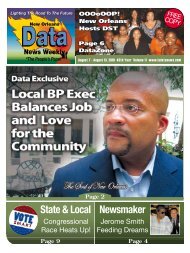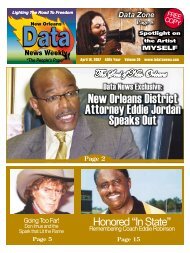Create successful ePaper yourself
Turn your PDF publications into a flip-book with our unique Google optimized e-Paper software.
Page 4<br />
August 28 - September 3, 2010<br />
Cover Story<br />
www.ladatanews.com<br />
Cover Story, Continued from page 2.<br />
Joseph M. “Scoop” Jones, <strong>Data</strong> <strong>News</strong> <strong>Weekly</strong> Founder<br />
Terry Jones, far right, stands with NNPA Foundation Chair Dorothy R. Leavell, who honored his<br />
father, Joseph Madison “Scoop” Jones, Jr., as a“Distinguished Black Publisher”. Jones, publisher<br />
of the New Orleans <strong>Data</strong> <strong>News</strong> <strong>Weekly</strong>, is joined by his son Glenn, holding the plaque. Also pictured<br />
are Dr. Clarence Muse, Howard University archivist, Moorland-Spingarn Research Center and NNPA<br />
Chairman Danny Bakewell Sr.<br />
other black newspapers, especially<br />
in surrounding states.<br />
It’s editions produced in Atlanta,<br />
its papers distributed in<br />
Atlanta, Dallas, Baton Rouge<br />
and Monroe - cities which<br />
housed displaced residents. So<br />
far away from home, <strong>Data</strong> gave<br />
people a level of familiarity that<br />
many were in need of.<br />
<strong>Data</strong> lost more than $150,000<br />
in equipment during Katrina,<br />
taking on about eight feet of water,<br />
destroying the first floor.<br />
BRW<br />
Club LeRoux<br />
1700 Louisiana Avenue<br />
New Orleans, LA<br />
September 4, 2010<br />
Doors Open at 7:45 pm<br />
9 pm - until<br />
“No employees, no equipment,<br />
no anything,” Jones<br />
says.<br />
or months following it’s<br />
return, <strong>Data</strong>’s Trailblazer, a<br />
monthly recognition given to<br />
locals in the business community,<br />
was awarded to people<br />
famous and ordinary for their<br />
extraordinary heroics during<br />
the city’s mightiest crises.<br />
Earlier this year, the newspaper<br />
returned to its weekly<br />
production schedule, part of a<br />
For Bookings<br />
Billy Kennedy 504-613-7712<br />
Email: billykenne@yahoo.com www.myspace.com/brwbk<br />
www.facebook.com/BRWNewOrleans<br />
newspaper which is now more<br />
streamlined.<br />
Employees that endured Katrina<br />
are now spread out from<br />
Texas to Washington D.C.<br />
Most have found other jobs.<br />
A few now work remotely for<br />
<strong>Data</strong>.<br />
<strong>Data</strong>’s story mirrors that of<br />
the city it serves, it’s resiliancy<br />
matching that of its residents.<br />
Vacant houses - some still<br />
with spray-painted symbols<br />
marking life and death - are<br />
common sights in neighborhoods.<br />
Basic services like<br />
shopping, eating at a nice restaurant,<br />
checking out a book<br />
from the library and going to<br />
the hospital for an emergency<br />
are often a luxury if you live<br />
in the wrong area west of the<br />
Twin Spans and east of Veterans<br />
Blvd.<br />
But like this great city, <strong>Data</strong><br />
will survive.<br />
GE: How did <strong>Data</strong> start<br />
TJ: My dad’s vision for this<br />
paper was an entertainment<br />
guide. He was retired from<br />
Seagrams, he wanted something<br />
to do. He always loved<br />
journalism. So he started this<br />
monthly entertainment guide<br />
that became weekly within the<br />
first year.<br />
Most of the ads were from<br />
bars, liquor companies. He<br />
wrote about black entertainers<br />
- Allen Toussaint, Fats Domino<br />
- there was no place to talk<br />
about those kind of folks. What<br />
happened is it got so popular,<br />
when election time came, they<br />
started putting in ads in the<br />
paper, so he got a push into<br />
politics and started broadening<br />
out. It kind of grew by itself.<br />
That wasn’t what my dad initially<br />
wanted. He wanted a little<br />
eight-page paper that was his<br />
side hustle to supplement his<br />
retirement money. He would<br />
probably be surprised, proud<br />
that I was able to bring it to<br />
this level.<br />
GE: Your father had a background<br />
in journalism<br />
TJ: He was a war correspondent<br />
in New Guinnea. He told<br />
a story that he was in an all-<br />
Black troop. The commander<br />
asked if anybody could type<br />
and he raised his hand. He<br />
couldn’t really type, he could<br />
only peck, but he could do better<br />
than most of them. So he<br />
got the job! From that point on,<br />
he started working in the office<br />
and writing stories to New Orleans<br />
about the Black soliders.<br />
They started being picked up<br />
by Black newspapers around<br />
the country. He put in to be a<br />
warrant officer, and since he<br />
was well known around the<br />
country for his writing he became<br />
an officer.<br />
GE: He worked as a salesman<br />
before starting the newspaper<br />
TJ: When he retired from<br />
Seagrams he made a deal with<br />
them to put an ad in <strong>Data</strong>. His<br />
partner, this guy name Sonny<br />
LaQUA, worked for City<br />
Wholesale Liquor. He had connections<br />
with the bars. So folks<br />
bought ads through Sonny and<br />
my old man, “Scoop” - that’s<br />
what we called him - he came<br />
in with money from Seagrams<br />
and they worked it like that.<br />
Got something to deliever the<br />
papers. My dad laid the whole<br />
paper out by hand with a board<br />
because back then, we had<br />
typesetters - you had to put<br />
the strip down on the board<br />
and set up the columns. If you<br />
had the wrong word you had to<br />
cut it out with an exacto knife<br />
and replace it. And we never<br />
missed an issue. [One day] my<br />
old man got sick and he made<br />
me bring the board to the hospital<br />
to lay out the paper from<br />
his bed.<br />
GE: Give us a peak into the<br />
future of <strong>Data</strong><br />
TJ: We’re revamping our<br />
web site to intergrate the print<br />
product with the Internet<br />
through blogs, for example. We<br />
also want to increase our circulation<br />
to west of the city. From<br />
our numbers, a lot of African-<br />
Americans since Katrina have<br />
moved there, bought houses<br />
and settled in Westwego and<br />
that area, so we’re going to<br />
concentrate [future distribution]<br />
there.


